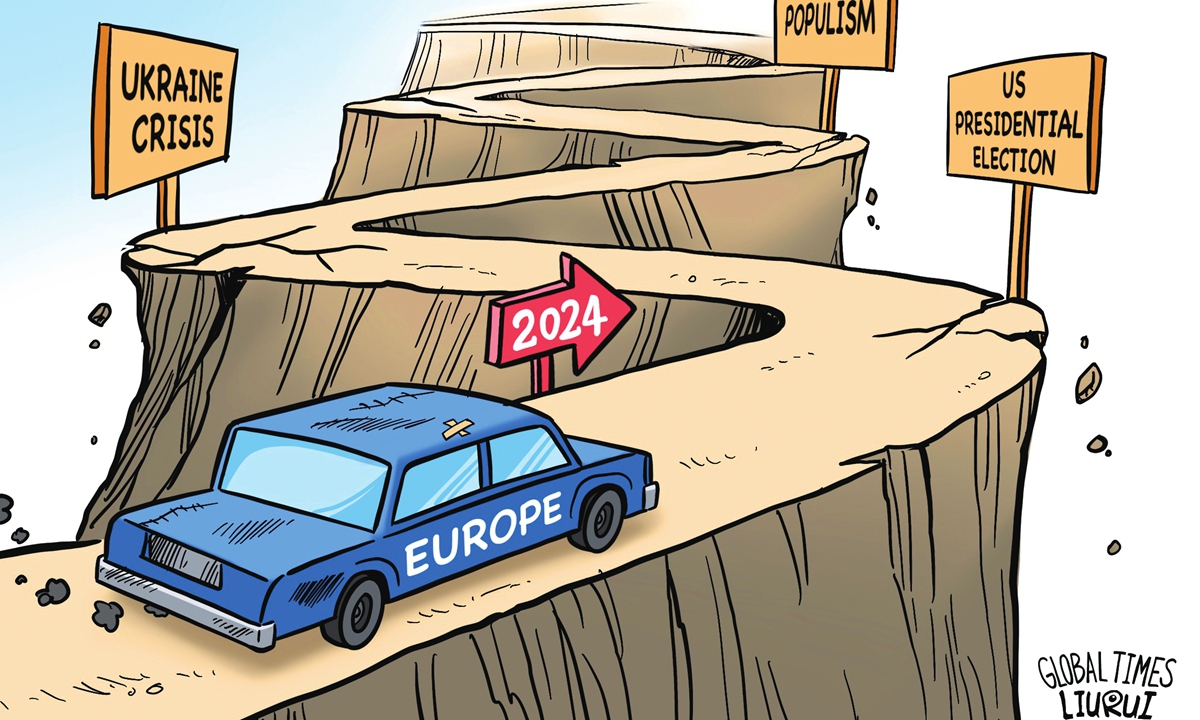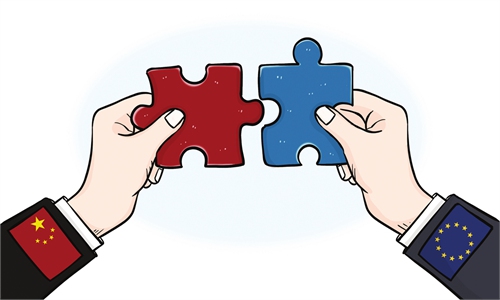
Illustration: Liu Rui/GT
In mid-October, representatives from Chinese and German media organizations held a dialogue in Berlin. I noticed that most participants from both countries hoped that the US election would bring stability to the world. The German media representatives in particular were more focused on the topic of the US election.
The desire for the US election to bring stability to the world is a sentiment shared by many after experiencing too much international turmoil and crisis, including the upheaval caused by the US election itself. The impact of the power transition in Washington in 2016 on global politics is unforgettable. People must adapt to abnormal changes, which is a characteristic of the world we live in. As German Chancellor Olaf Scholz puts it, we are in a "historic turning point." The complexity of this turning point lies in the fact that it does not change in a straight line or in just one direction; rather, it crosses boundaries repeatedly, evolving in a disorderly manner. While the nature of change itself remains constant, each change possesses its own uniqueness.
In my conversations with European friends, I have clearly sensed their anxiety about the US election and their lack of alternatives. This concern is justified. The pressures facing Europe are likely to be immense. In the wake of the Russia-Ukraine conflict, the continent is more reliant on the US for security than at any time since the Cold War. However, the post-election US may not want to bear such dependence unless Europe pays a significant price. This situation means that Europe is drifting further away from the ideal of an independent and autonomous security policy. Europeans are quite concerned about the future trajectory of the Russia-Ukraine conflict. Even now, Europe still believes that the US is a reliable security guarantor, which is quite astonishing. The US has long been regarded as the police of the international order and a guarantor of European security, yet Europe has still experienced bloody conflicts and has been deeply troubled by the turmoil in the Middle East. In both of these conflicts, the US has been a key player and a decisive force in how to end the conflicts.
Despite China's repeated statements that it has no desire to challenge the US hegemonic position, Washington views China as an unprecedented challenge and threat in its history. The US defines the China-US relationship as one of strategic competition, imposing extreme restrictions on China in key areas such as technology, and collaborating with allies to hinder China's global development. The ultimate goal of the US is to maintain its absolute hegemonic position in the world, believing that China should be a subordinate, as Europe is. There is a high level of consensus among the major political forces in the US, despite their opposition on other issues, regarding this stance. Looking back at history, Europe, Japan and the Soviet Union were powerful forces that the US had to contend with in its pursuit of world hegemony; these countries either succumbed to US conquest or yielded before it.
The US also believes that it can apply the same strategy it used to deal with the Soviet Union to "outcompete" China. This serves as the starting point for its "system competition" against China. Regarding its relations with the US, China's attitude remains unchanged. In the words of the Chinese strategic community: prepare for the worst, make the best preparations, and put in the greatest efforts. China hopes that it and the US can achieve mutual respect, peaceful coexistence and win-win cooperation, and that the relationship between the two countries can develop in a stable, healthy and sustainable manner. Of course, this is Beijing's wish. How will Washington respond? Regardless of the method, after experiencing several twists and turns in China-US relations, Beijing has taken the fate of security and development into its own hands.
Times have changed, and the anxieties of sovereign states should also evolve. The accelerating deterioration of climate change transcends borders and poses a disaster that affects all of humanity, which can only be addressed through the joint efforts of all countries. Today, the United Nations Framework Convention on Climate Change and the Paris Agreement have established a binding foundation for this endeavor and placed humanity's hopes upon it. The upcoming US election may pose a challenge to these efforts: The world's most powerful country may once again withdraw from the Paris Agreement and even abandon the Framework Convention on Climate Change. The world's largest economy may seek to revitalize fossil energy and oppose the wind energy, solar energy and electric vehicles that various countries are vigorously promoting. If this happens, it will undoubtedly spell bad news for the decarbonization efforts of all countries around the world and pose a threat to the common security of humanity. Countries, including those in Europe, should be worried about this possibility.
The author is a research fellow at the Shanghai International Studies University. opinion@globaltimes.com.cn



